[ad_1]
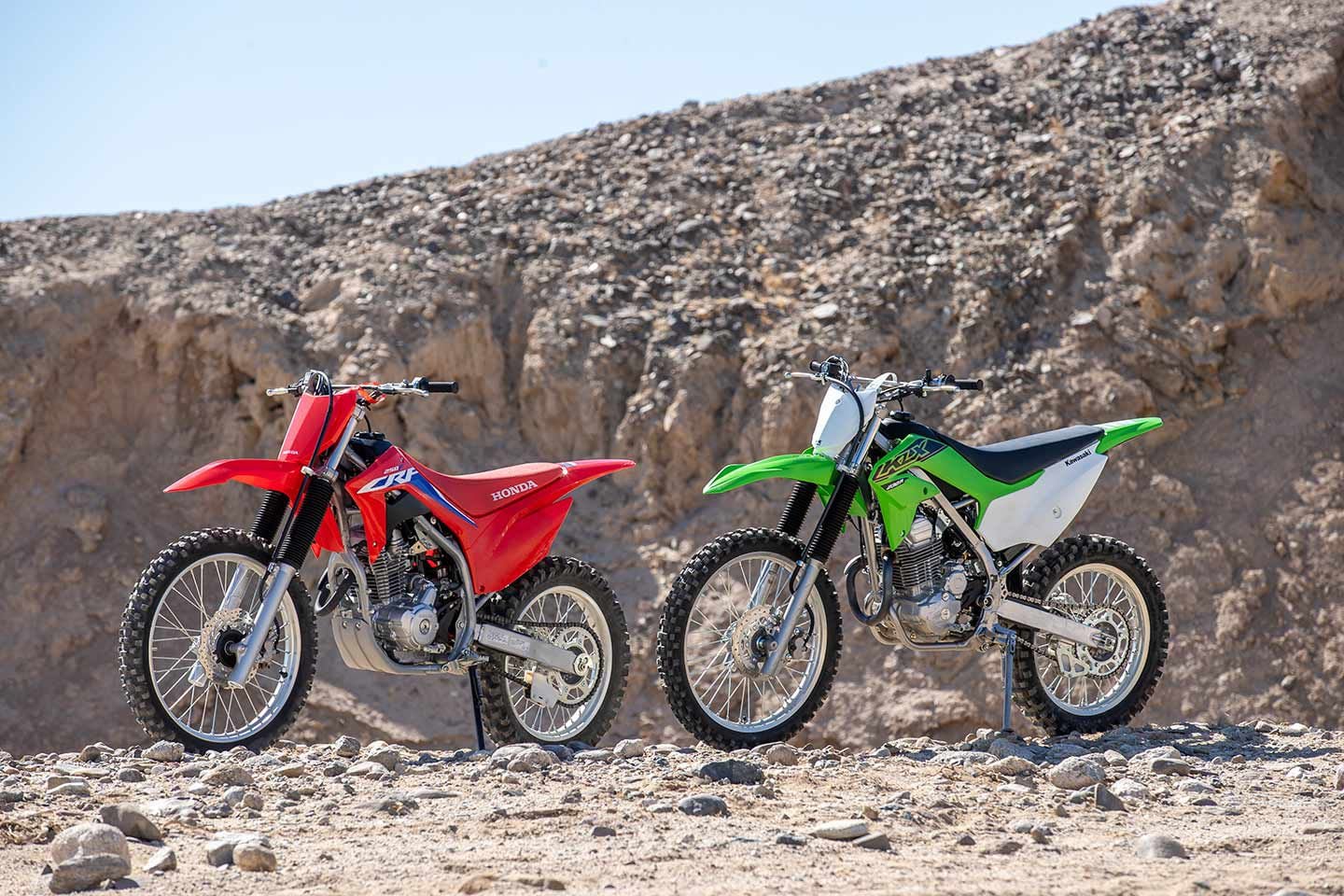
If you happen to trip bikes, you in fact know that purple and inexperienced symbolize two of probably the most well-known bike producers on this planet—Honda and Kawasaki. Whereas their company colours might differ, one of many many issues these corporations have in frequent is the flexibility to supply high-quality, recreationally targeted path bikes which might be equally as pleasant to the rider as they’re to his or her pockets. Sure, these are actually enjoyable, versatile bikes for not some huge cash.
Honda’s CRF230F carried Large Purple on this class for years, nevertheless it was changed in 2019 by the CRF250F. The subsequent 12 months, Kawasaki unveiled its KLX230R aiming to take a chunk of the path bike pie. Pricing for the 2023 fashions (our testbikes are ‘22s) is sort of shut: The Honda CRF250F’s MSRP is $4,899, and the Kawasaki KLX230R’s MSRP is $4,749.
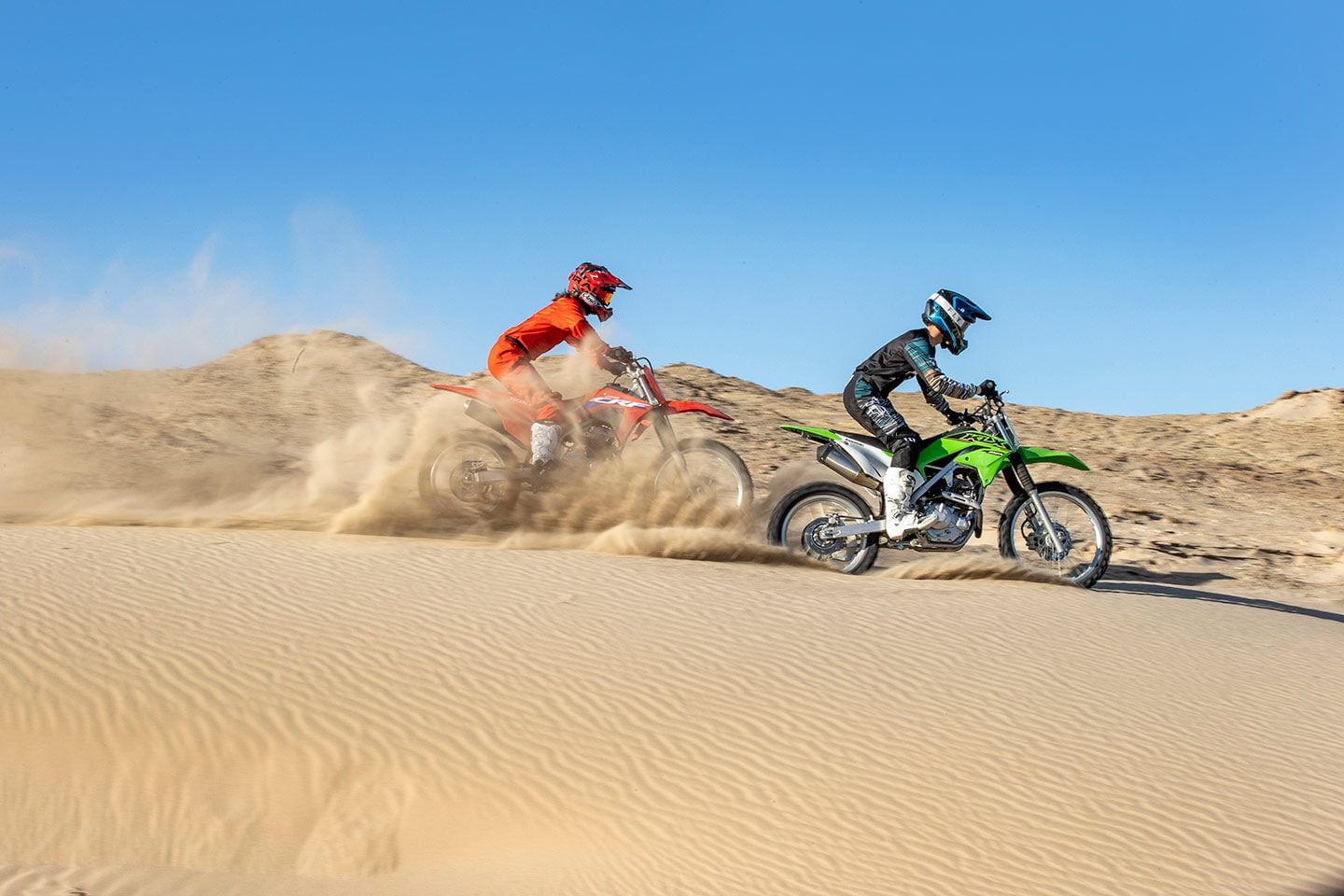
Whereas the Honda CRF250F and Kawasaki KLX230R four-stroke engines have comparable specs, their air-cooled singles have displacements that aren’t an ideal match (CRF is 249cc and the KLX is 233) however are definitely shut sufficient for comparability’s sake—and the bikes are undoubtedly aimed on the similar buyer. The Honda not solely has extra displacement, nevertheless it additionally includes a four-valve cylinder head in comparison with the Kawasaki’s two-valve design.
Each fashions function customary full-size off-road wheels with 21-inch fronts and 18-inch rears, offering an abundance of aftermarket tire choices. Each producers have additionally fitted their respective fashions with practically similar brakes: Twin-piston calipers and 240mm rotors are discovered up entrance, and single-piston calipers squeeze 220mm discs on the rear.
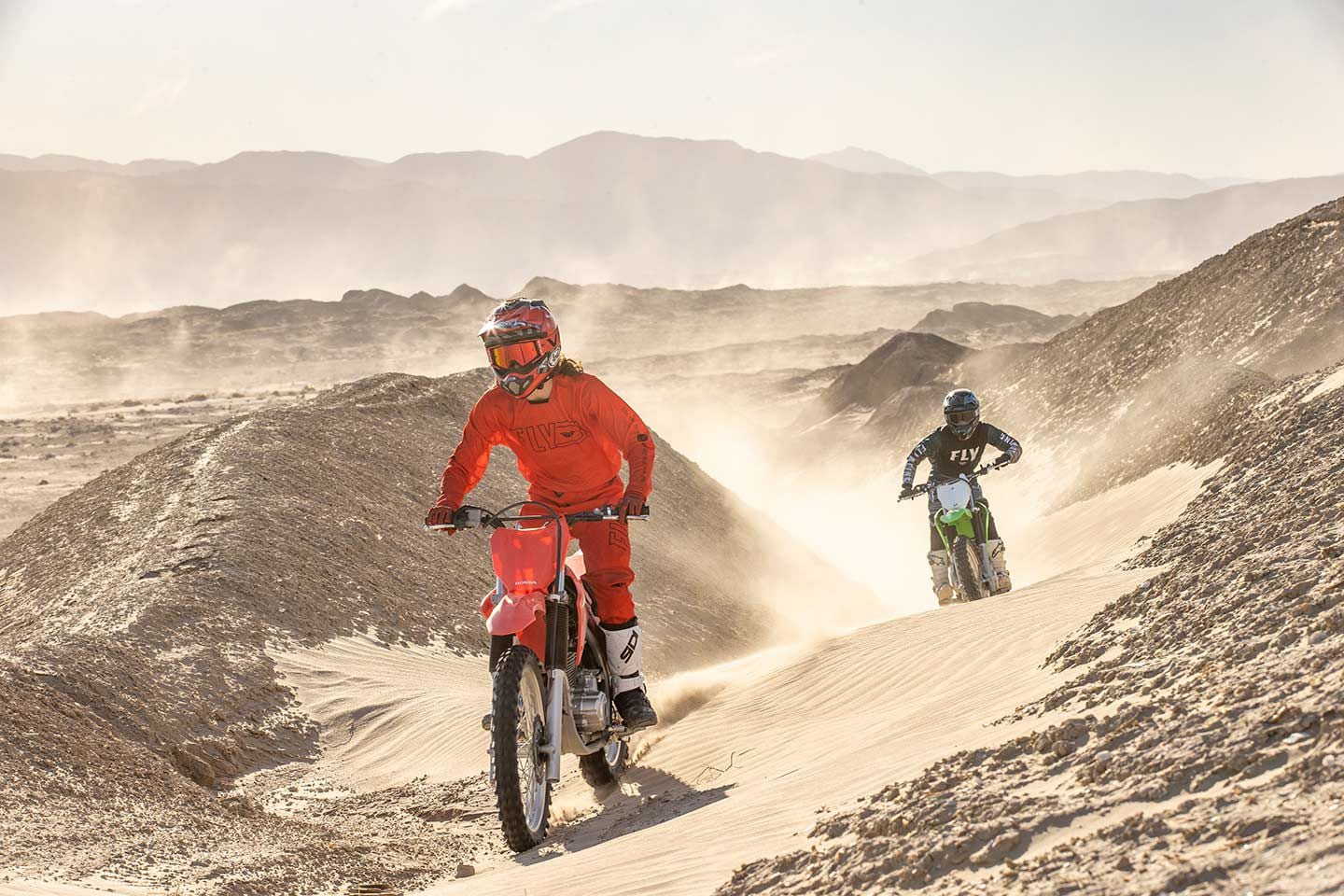
Engines
That includes a bigger engine than its predecessor together with digital gas injection (EFI) and electrical begin, the CRF250F is prepared for the roaring twenties (2020s, that’s). On our in-house Dynojet 250i rear-wheel dynamometer, the quarter-liter Honda made 20.1 hp at 7,500 rpm and 15.5 lb.-ft. of torque at 6,000 rpm. The rev limiter kicked in at 9,100 rpm.
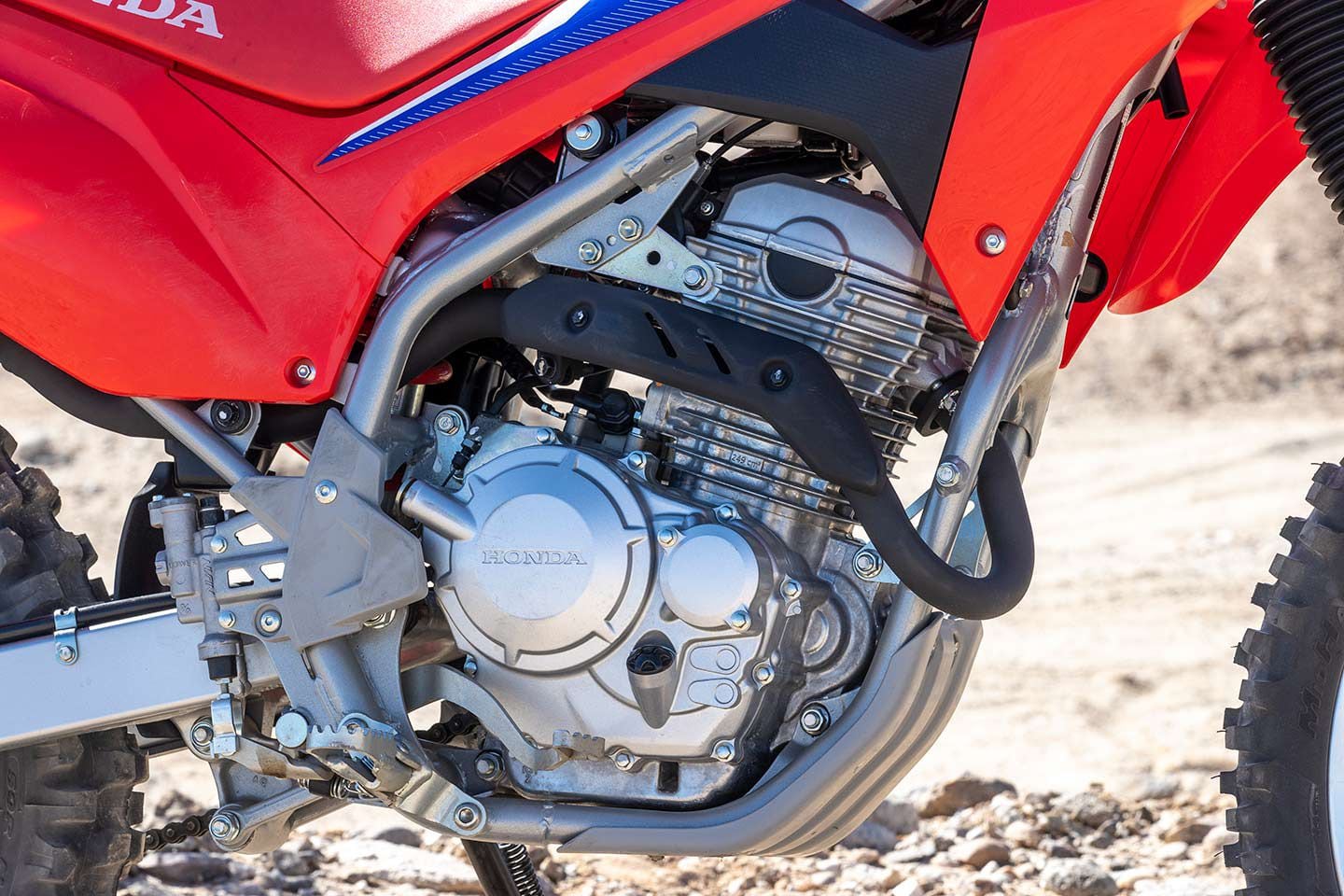
The CRF’s SOHC four-valve powerplant impressed with its linear powerband and quick-revving nature. It has good, usable energy all through your entire rpm vary. A big a part of our time testing this mannequin was on tight single-track and choosing our means by means of rock gardens, the place lugging the bike round in second gear wasn’t an issue. With loads of bottom-end to blip the bike out of corners or up over rocks, the CRF250F was straightforward to trip in tight and technical terrain.
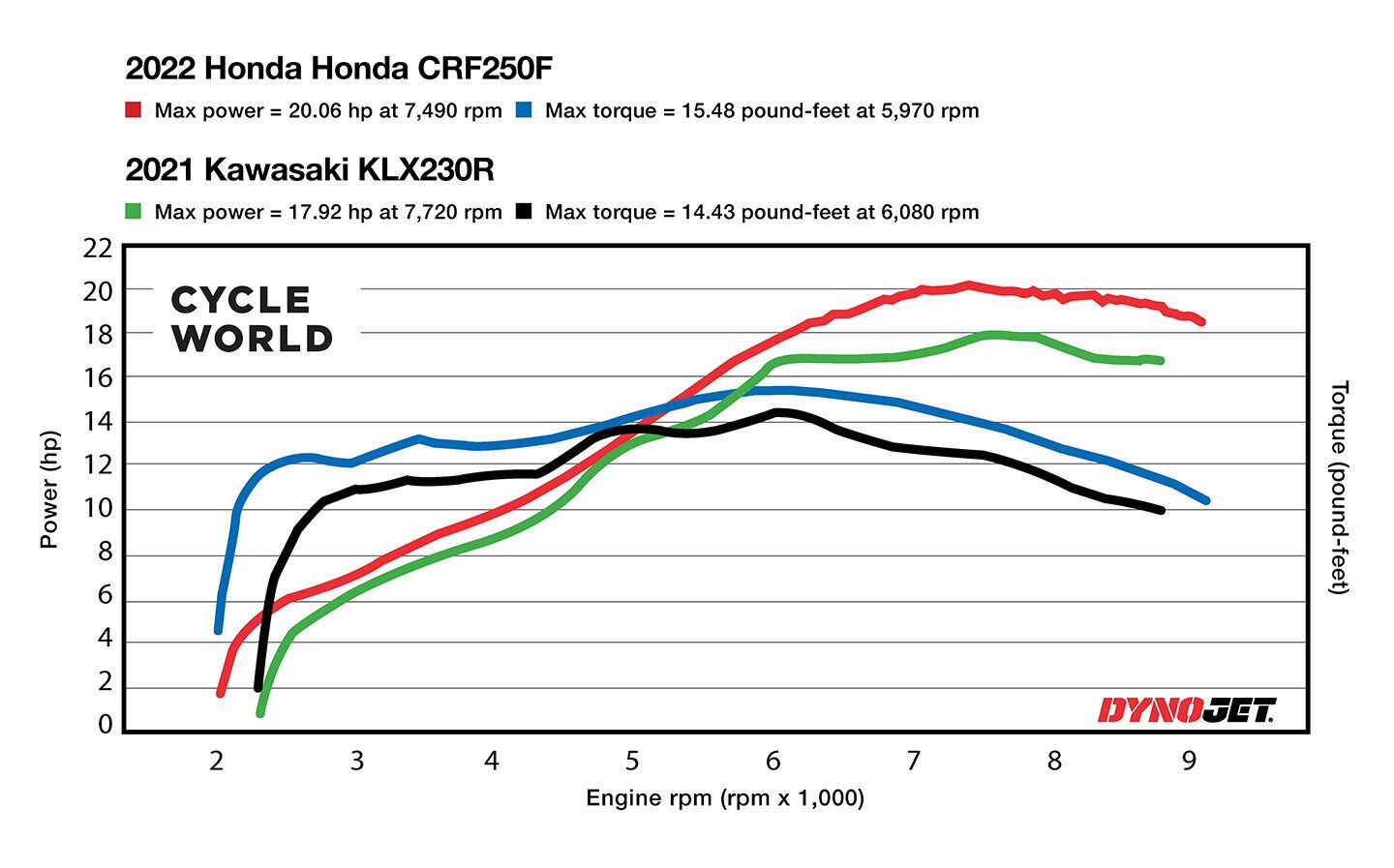
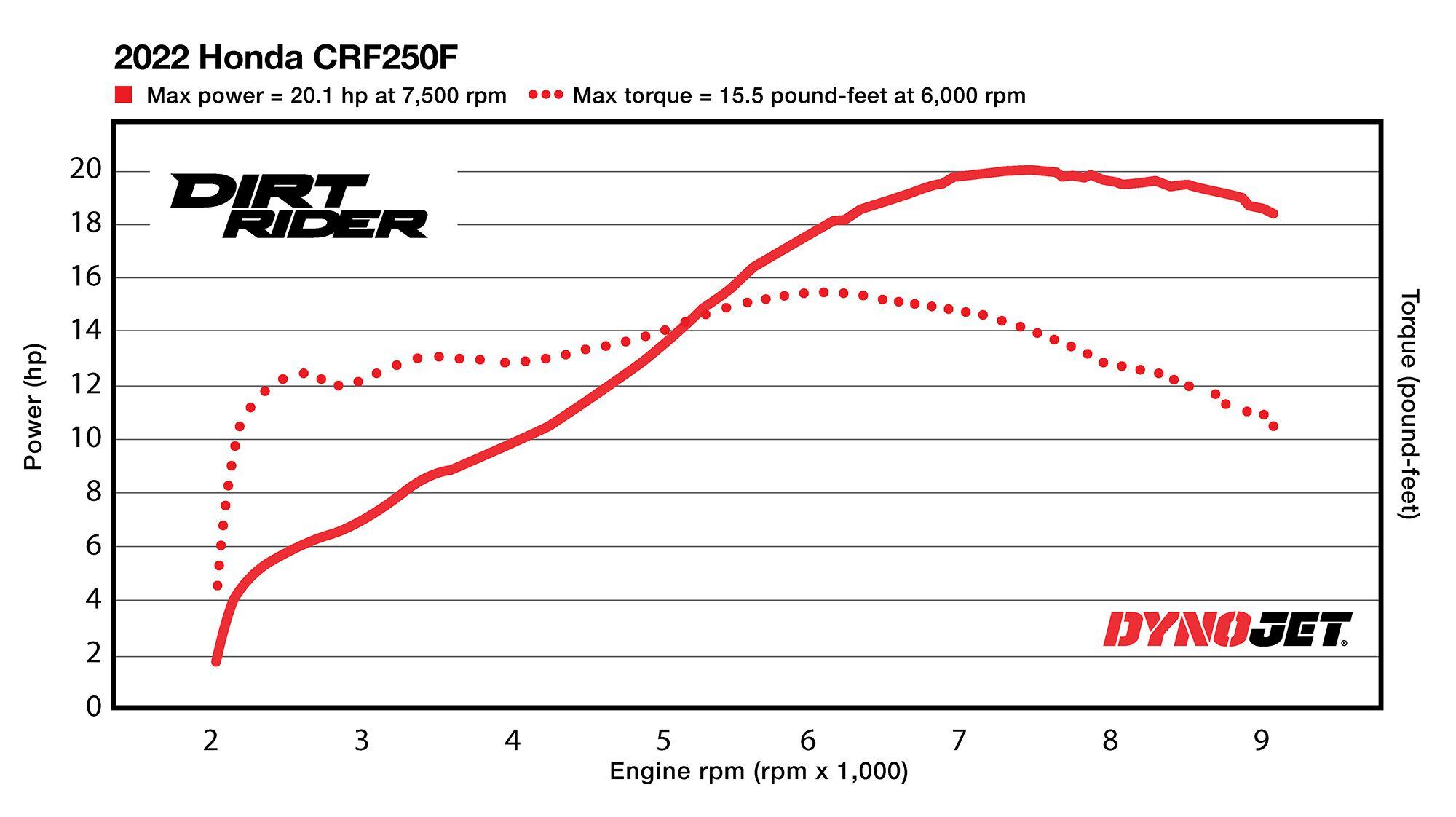
The CRF engine’s tractability and ample flywheel mix with glorious gearing within the five-speed transmission (working by means of a 13/50 last drive sprocket combo), which undoubtedly contribute to the bike’s means to get into movement from a near-dead cease in second gear. Even on the tightest path we may discover, shifting all the way down to first gear felt pointless so long as we had any rolling pace in any respect. From a real lifeless cease, first gear was quick sufficient to make the bike troublesome to stall and to provide the torque you could simply get happening steep hills.
The cable-actuated clutch is clean and simple to interact, offering a fast surge of tractable energy at a dip of the lever.
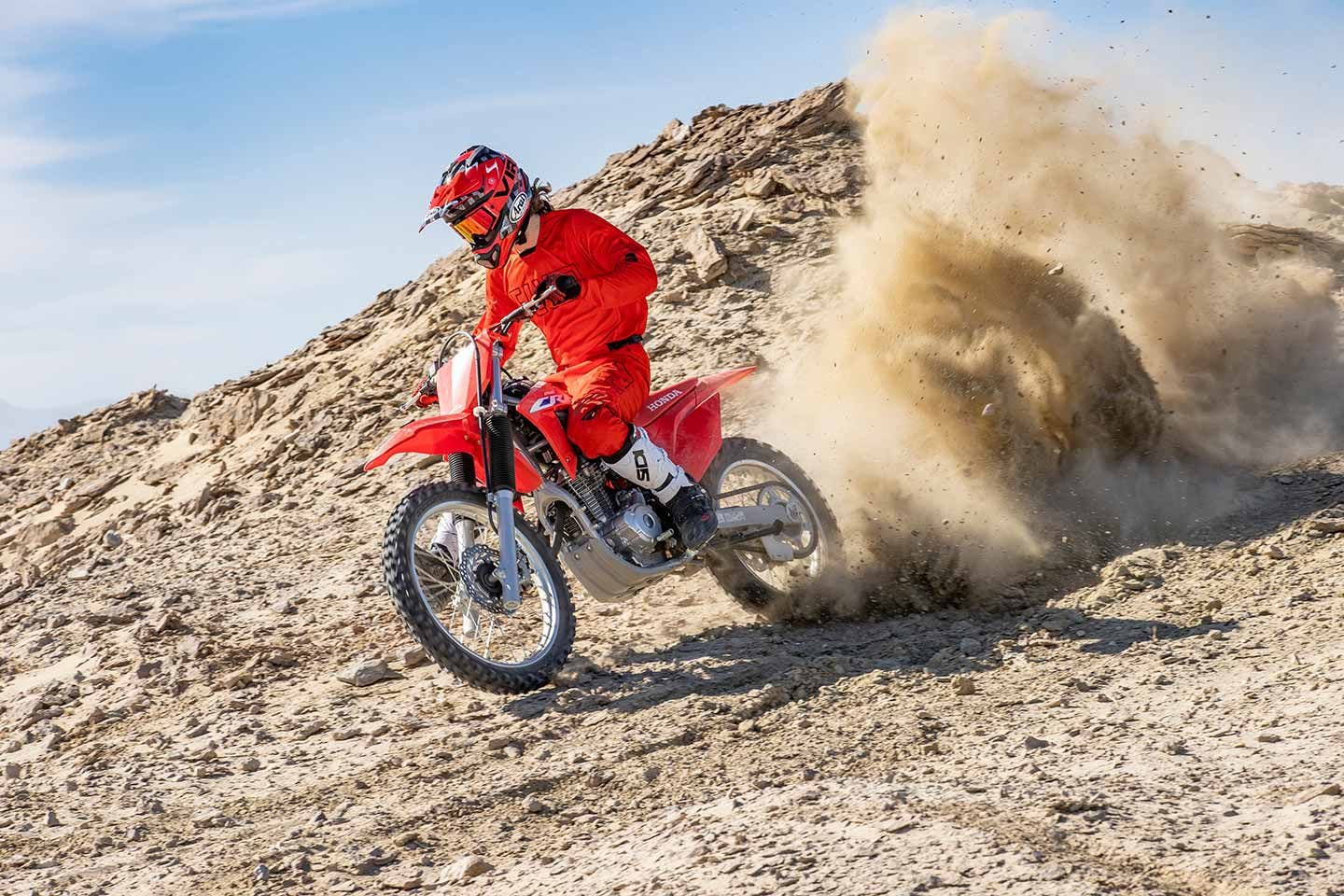
Because the path opened up, the Honda’s willingness to rev shortly paid dividends. Seize a handful of throttle and the Honda places the ability down all the best way to redline. With the assistance of a very good knobby tire, the CRF250F generates strong drive and feels sporty and prepared to go quick. It doesn’t possess the identical kind of aggressive energy supply as a contest mannequin, and that’s completely nice on this class. What this interprets to is a bike that gives the rider with a whole lot of confidence, even when pushing the bounds of the machine. How so? Grabbing a handful of throttle doesn’t make you’re feeling such as you’re going to be chucked to the bottom however does give a satisfying and controllable surge of ahead movement.
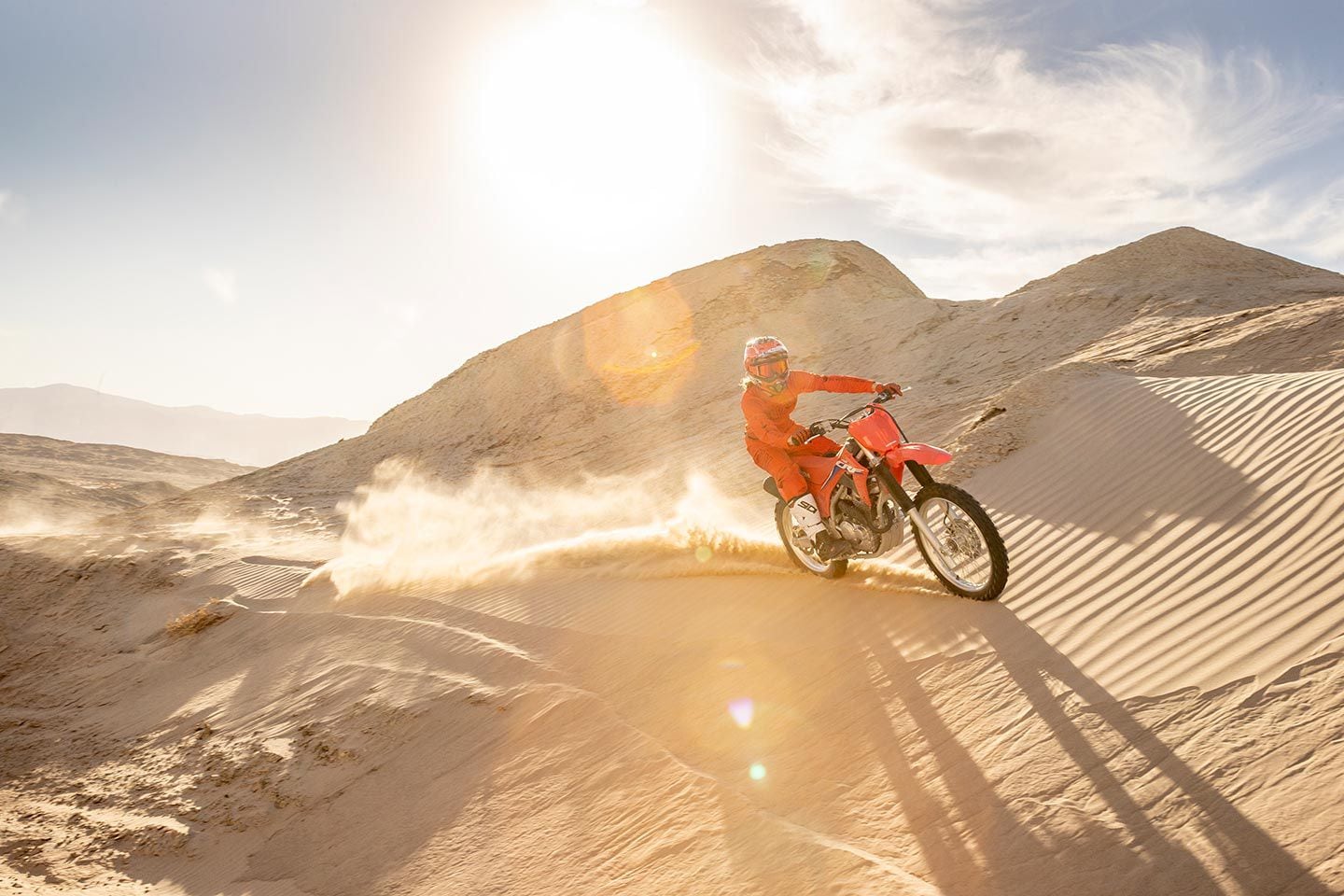
Group Inexperienced’s KLX230R is barely down on energy in comparison with its purple rival, as could be anticipated given its 17cc (6 %) displacement drawback. The inexperienced machine’s fuel-injected SOHC engine produced 17.9 hp at 7,700 rpm and 14.4 lb.-ft. of torque at 6,100 rpm on our dyno. At peak, that’s 2.2 hp and 1.1 lb.-ft. of torque lower than the CRF250F, which is 11 % much less horsepower and eight % much less torque. That’s not insignificant, nevertheless it additionally comes all the way down to how the ability is delivered.
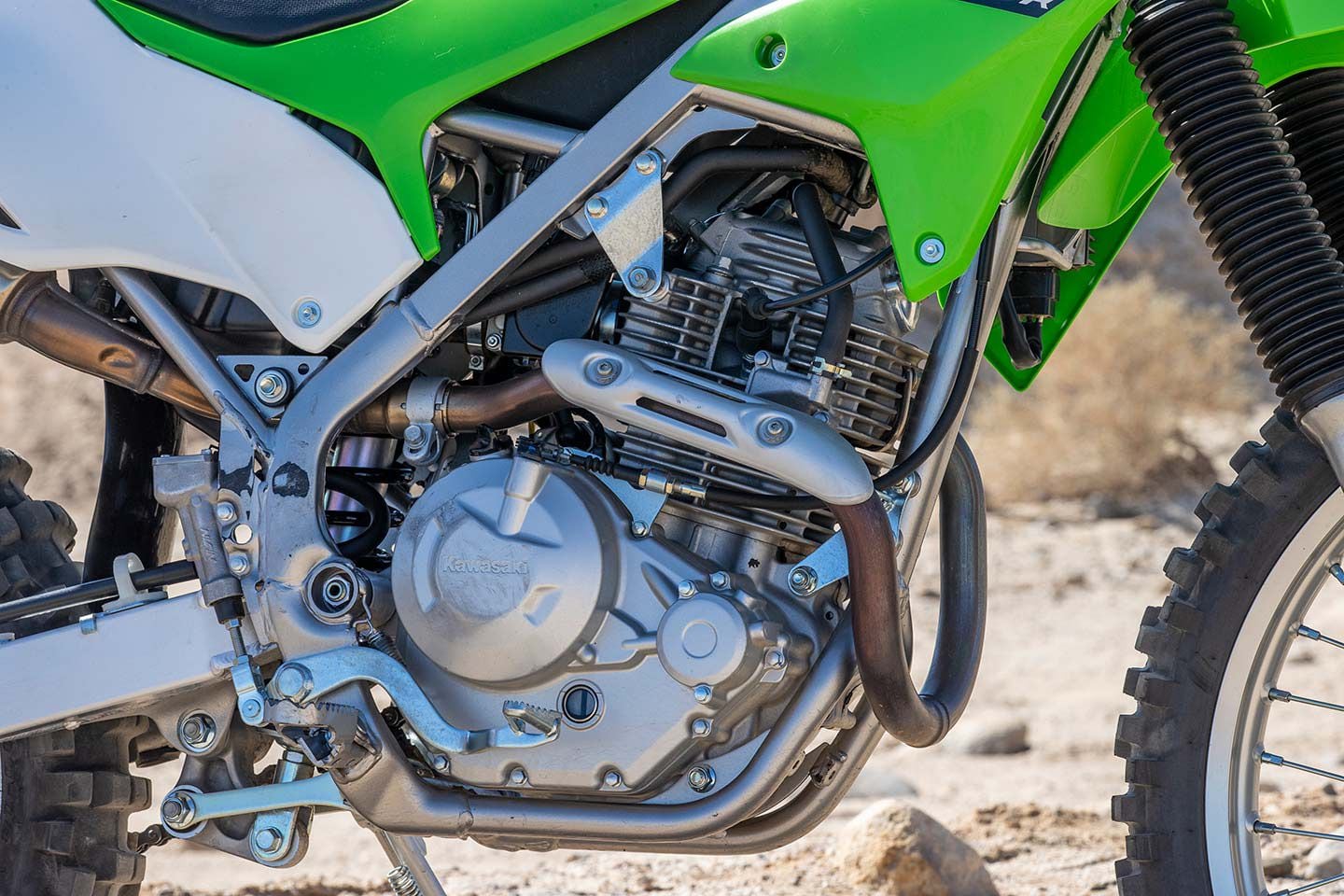
From the seat of the pants the KLX230 appears to have a stronger midrange pull than the CRF250F, however after reviewing the dyno curves, it’s clear the Honda produces extra horsepower and torque all through your entire rpm vary. That seat-of-the-pants midrange pull feeling? It comes from the truth that the Kawasaki’s torque curve will not be as linear because the Honda’s. The Kawasaki has a sudden spike in torque round 4,400 rpm that makes the midrange really feel stronger than it truly is due to how quickly output rises. Energy supply is slightly flat down low and doesn’t dangle on as lengthy on high as does the Honda, however the Kawasaki KLX230R feels perky and enjoyable (partly due to that preliminary spike) within the midrange. Peak horsepower happens roughly 1,000 rpm earlier than the 8,800 rpm rev restrict.
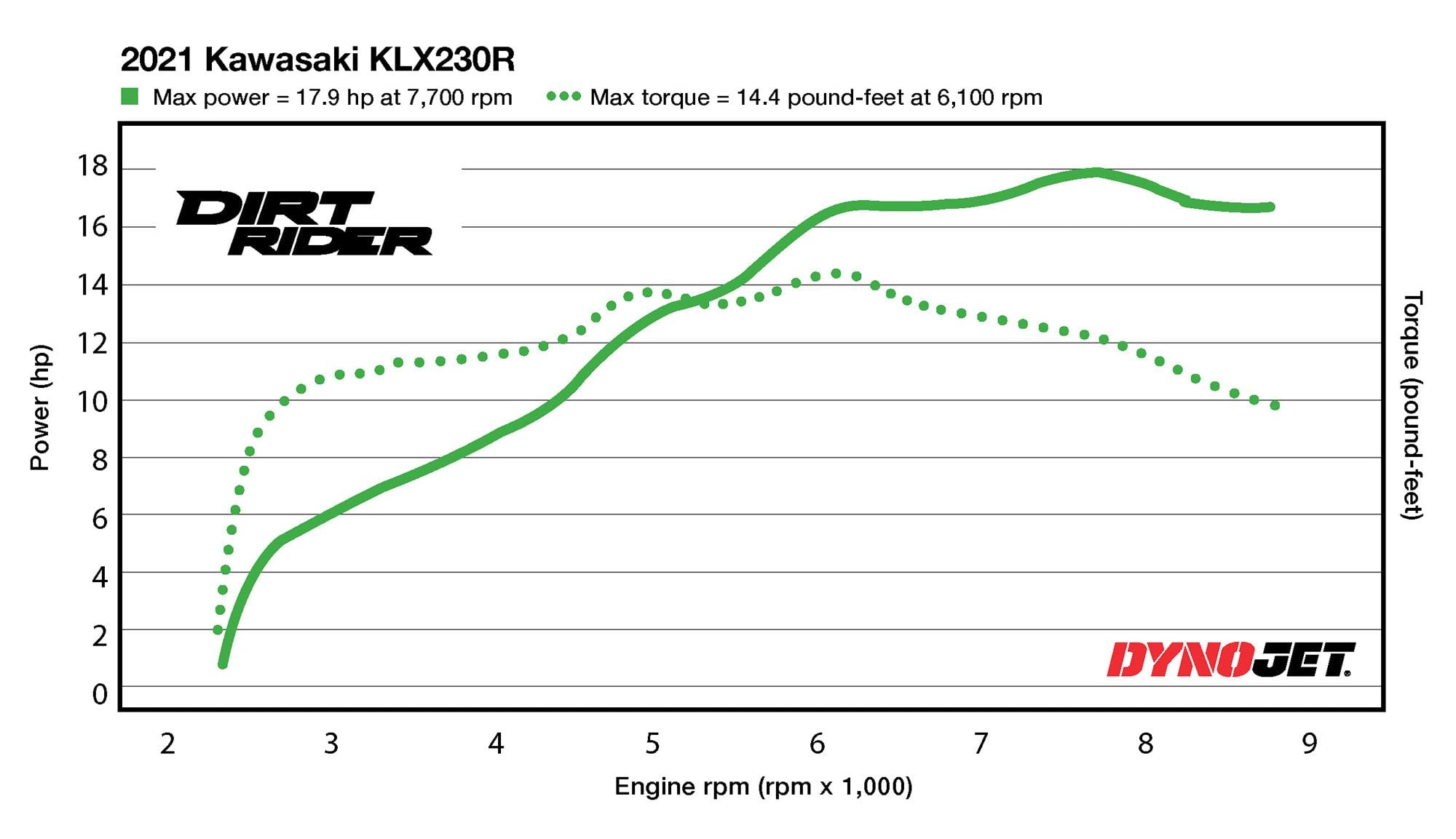
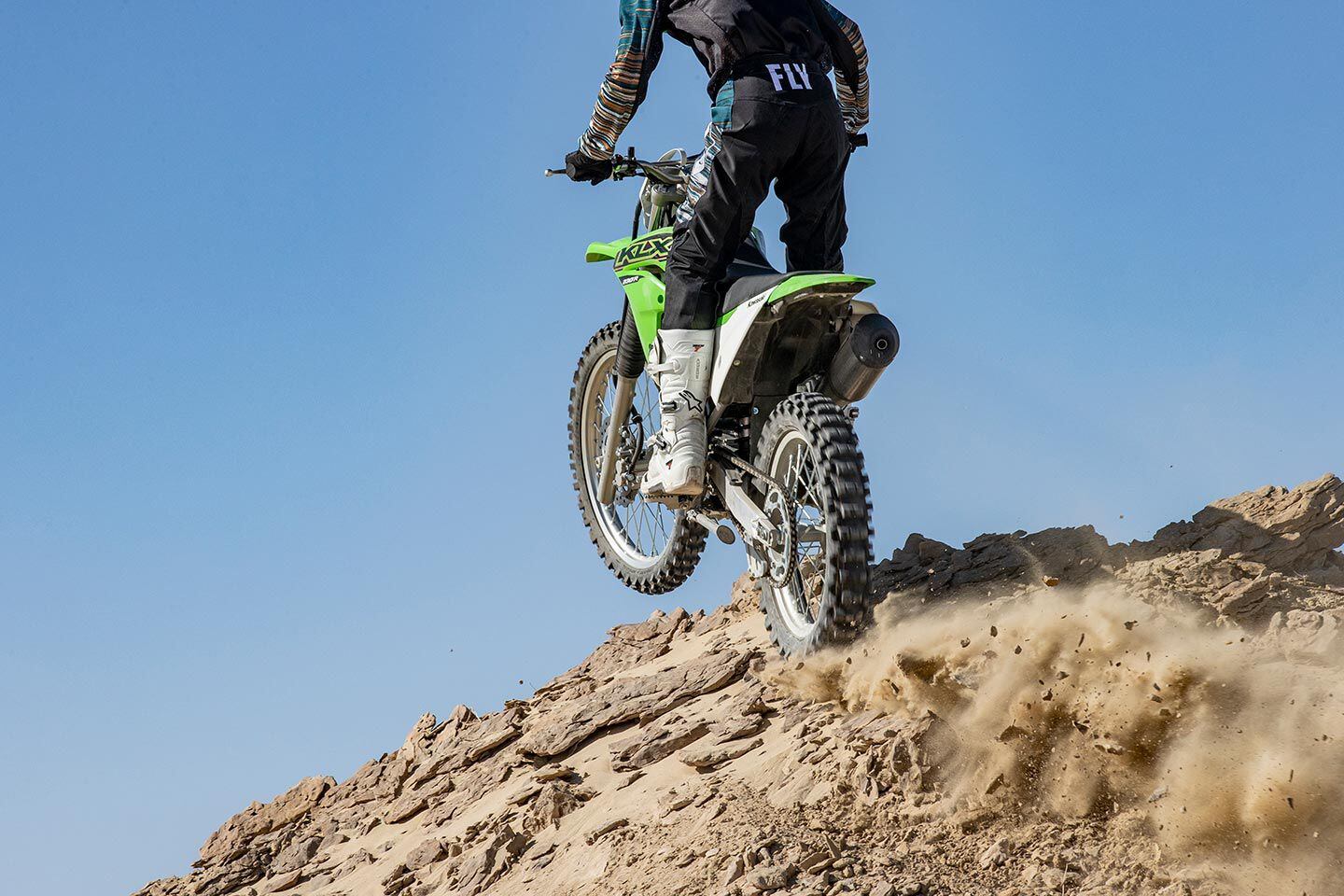
Though each bikes are capable of deal with the identical rocks and terrain, the Kawasaki doesn’t have the moment low-end snap the Honda affords. So as to wheelie the Kawi to recover from obstacles, the clutch must be abused fairly a bit extra. When beginner-level tester Kyle Woertink was requested in regards to the Kawasaki’s low-end traits, he stated: “It’s not very robust, particularly whenever you want it.” The KLX’s engine additionally isn’t fairly as clean and refined, feeling extra uncooked total and producing extra vibration within the higher rev vary.

Primarily, as a result of decrease total output and fewer refined torque curve, the Kawasaki KLX230R engine requires extra administration to make sure it’s within the meaty a part of the rev vary. It isn’t overly distracting, nevertheless it provides to the psychological workload—notably for newer riders—when making an attempt to overcome a troublesome part. At medium pace and within the midrange, popping wheelies and lifting the entrance wheel turns into simpler. We’d simply choose to get the identical burst of energy decrease within the rpm vary the place it may be utilized at sluggish speeds in second gear.
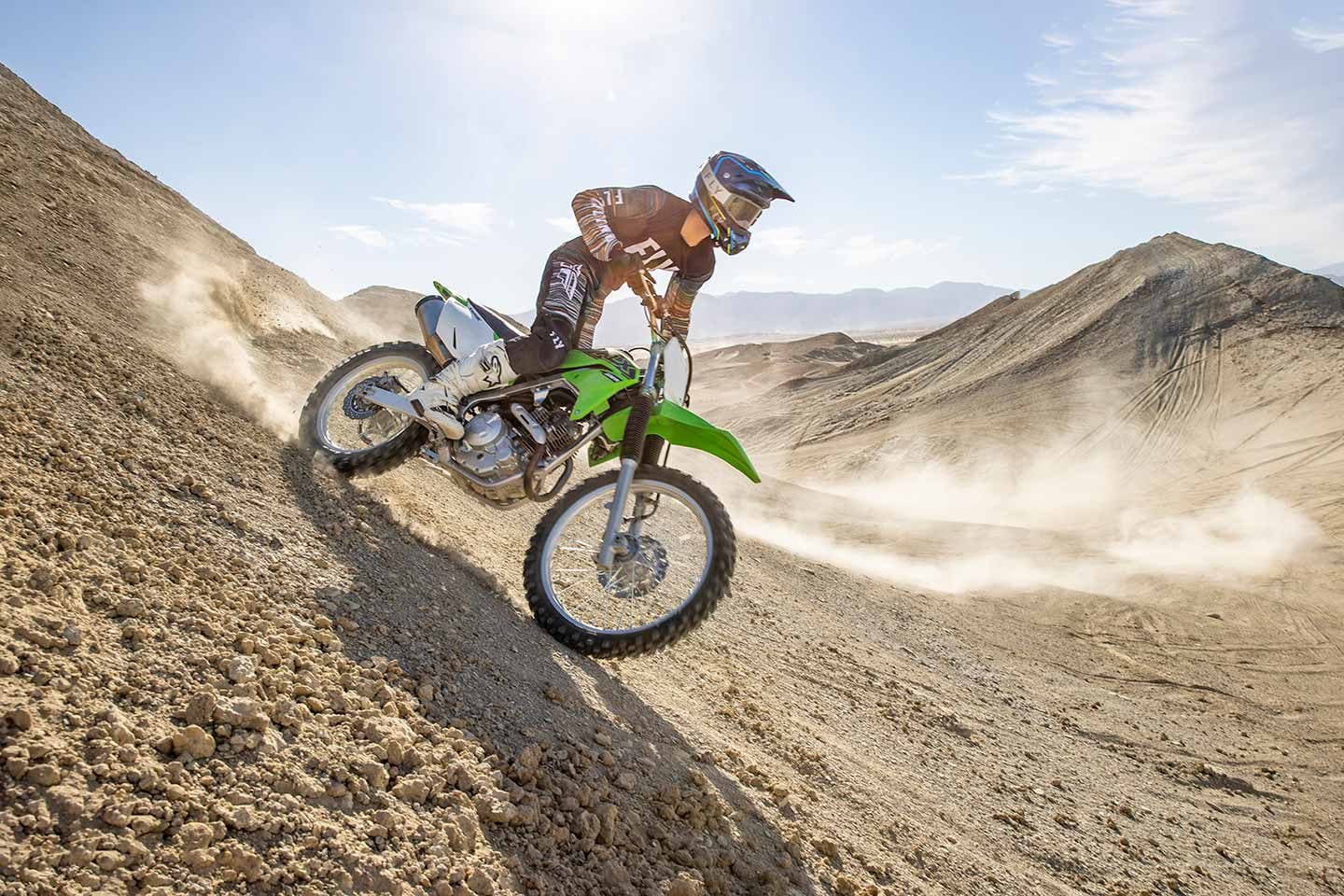
Chassis/Suspension
The Honda’s suspension is, in a phrase, plush. The CRF250F is spec’d with a nonadjustable Showa 41mm fork, and a spring-preload-adjustable shock. Journey is 8.5 inches up entrance and 9.1 inches on the rear, with well-chosen spring charges that maintain up the bike at low to medium speeds. When coming upon tight sections that require slightly manipulation of the suspension by preloading the fork and shock to weight and unweight the bike, the parts supply compliance within the preliminary a part of the stroke then turn into progressively stiffer with loads of bottoming resistance—so long as the tempo wasn’t too quick.
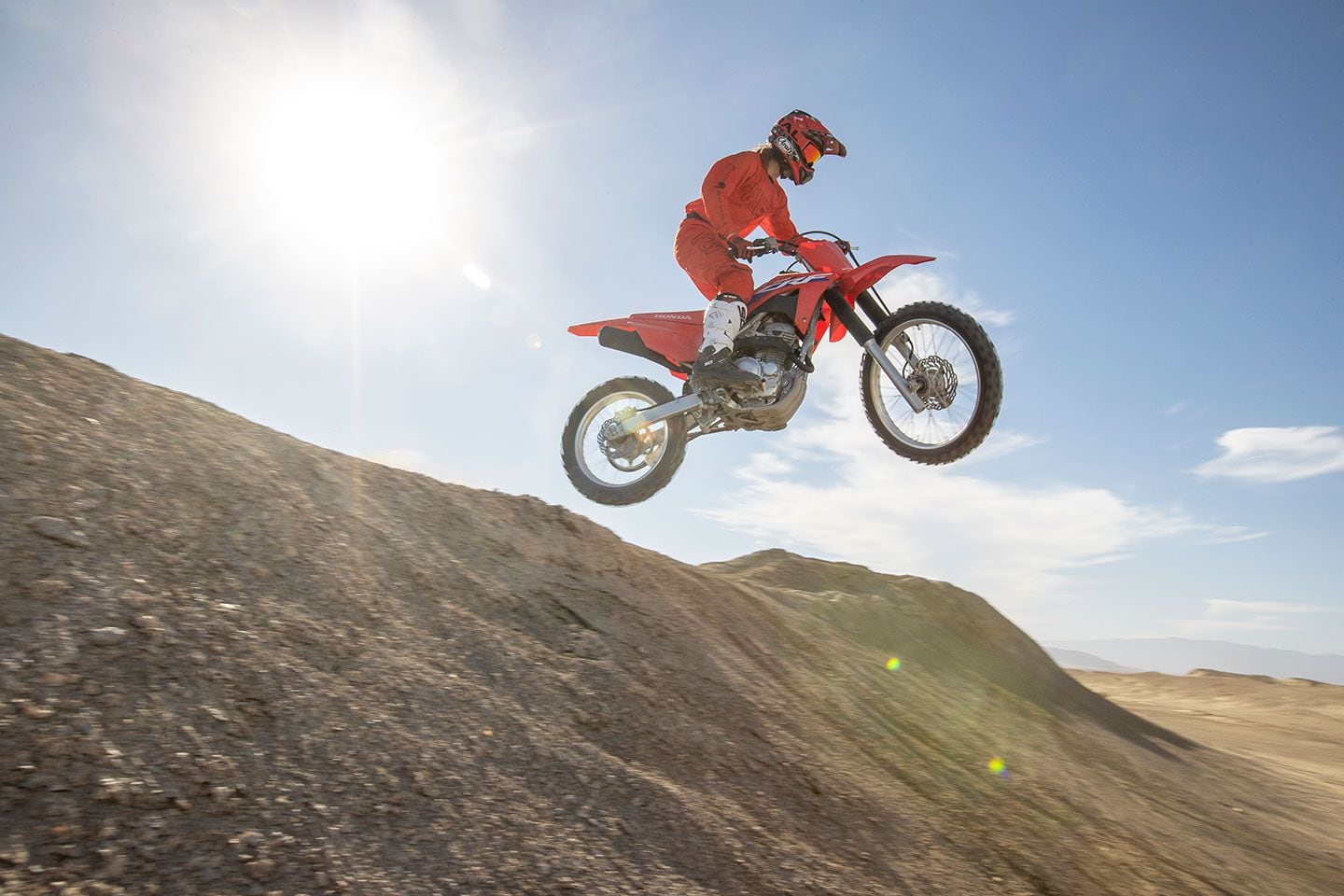
The fork and shock by no means bottomed when touring at low to medium speeds. Up the tempo by means of tough terrain and the shock blows by means of the stroke and bottoms out in G-outs, whoops, or on different bigger obstacles. For extra superior riders, the secret’s to discover a joyful medium between shifting at a decent tempo but additionally understanding the bike’s limits. “It was higher to trip with extra precision and finesse,” intermediate-level motocross check rider Michael Wicker stated. “Riders who cost and plow by means of every part quick are most likely not going to be probably the most comfy.”
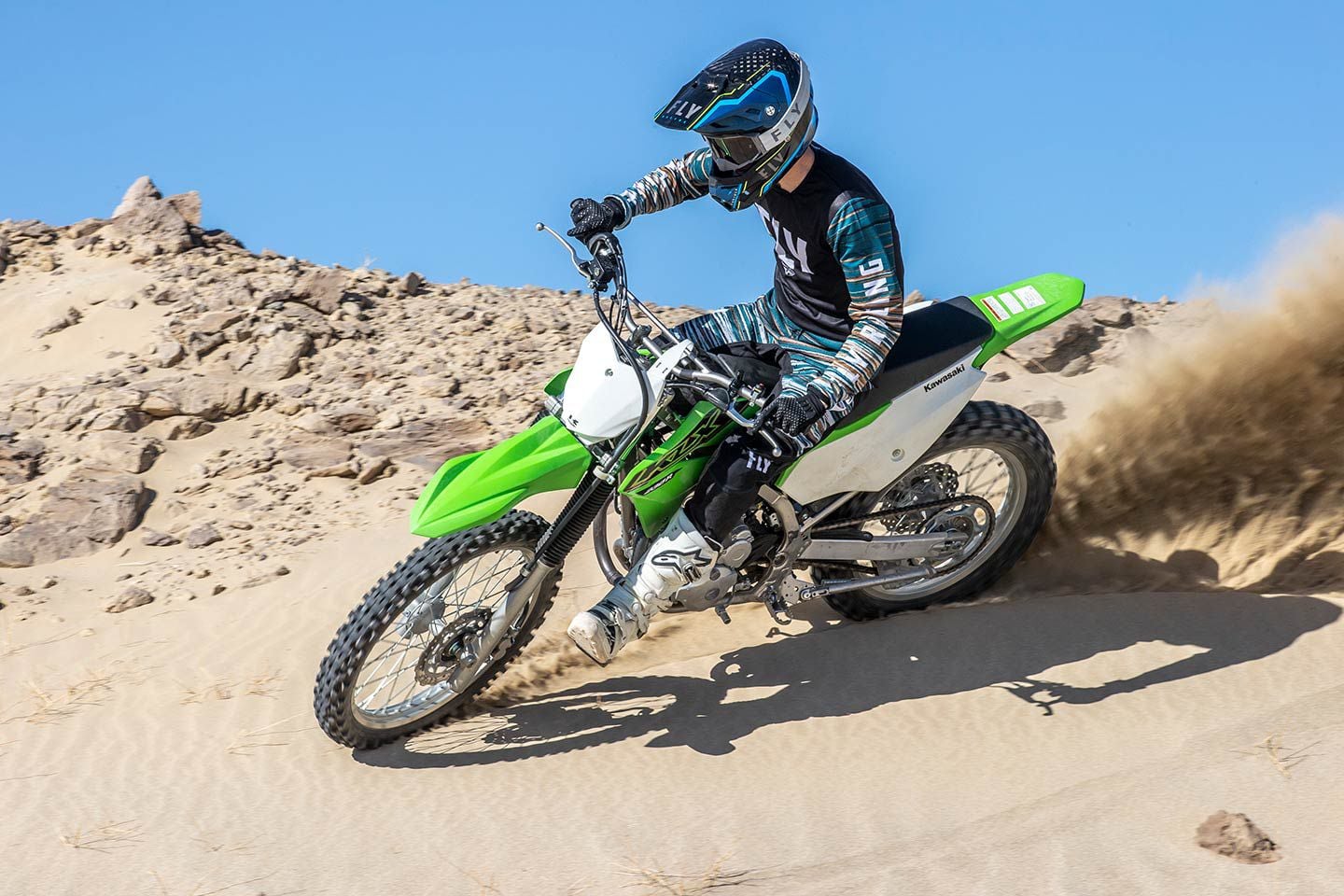
That stated, for a low-cost playbike, that is glorious suspension tuning for the meant market; total the CRF250F affords a particularly user-friendly trip.
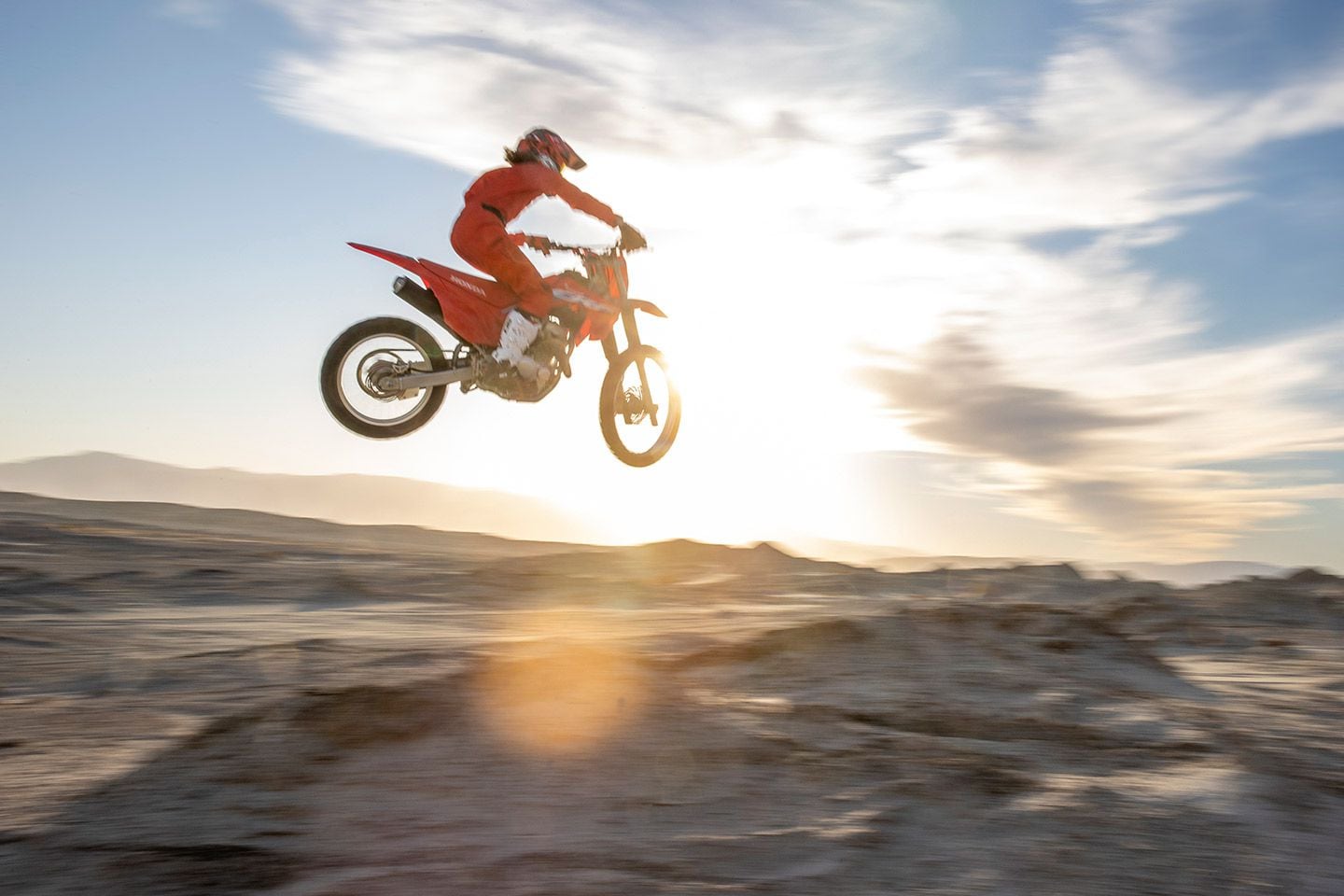
Not solely does the Kawasaki forfeit measurement within the engine division to the Honda, nevertheless it’s additionally outfitted with a fork with smaller-diameter stanchions. The Showa 37mm unit is nonadjustable, whereas the Showa shock is adjustable for spring preload. Journey is 9.8 inches up entrance and 9.9 inches on the rear.

The KLX230R might have skinnier fork legs, however the bike has extra suspension journey than the CRF250F entrance and rear (1.3 inches and 0.8 inch, respectively). This elevated journey additionally contributes to a 1.5-inch-taller seat top, as measured in our check procedures. Though the stance of the KLX230R feels excessive within the rear, the elevated journey permits the fork to remain within the candy spot of the stroke extra usually, whereas providing a extra compliant, comfy feeling. This entrance suspension efficiency is the place the KLX230R outshined the CRF250F.
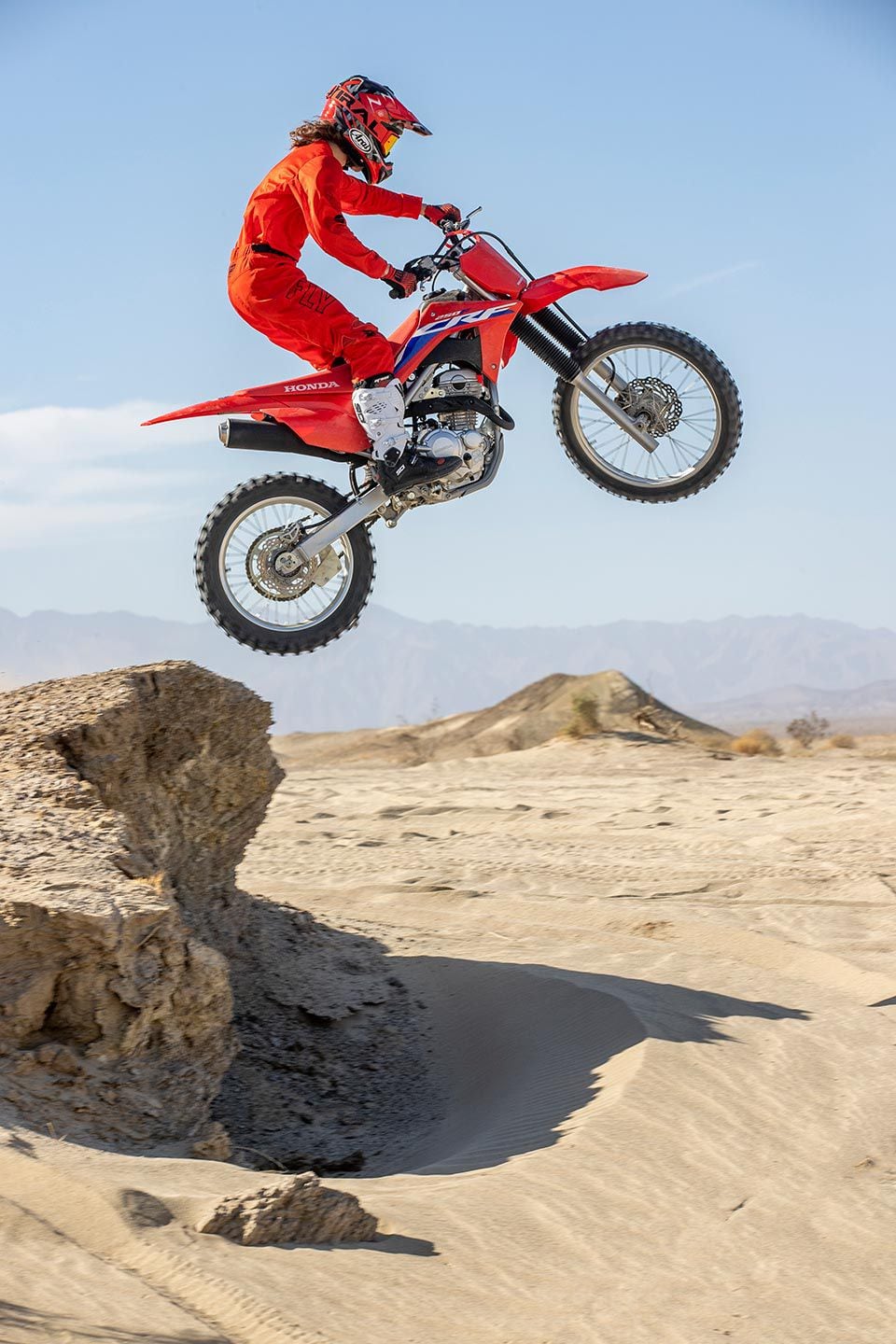
The Kawasaki’s suspension will not be excellent although. The rear finish is oversprung in comparison with the fork. To be truthful, our check riders had been on the lighter aspect, so heavier riders might respect the stiffer rear settings, particularly if driving seated. We discovered the supple fork contributed to the 230′s agility in tight rocky sections, however at quicker speeds, we had much less confidence within the entrance’s means to take care of traction when leaned over. It is a results of the unbalanced chassis and the KLX’s rear-high stance placing an excessive amount of weight on the entrance finish. When hitting quick sections with massive bumps, whoops, or jumps, the rear finish tends to go full huck-a-buck with robust rebound. Lowering the preload adjustment on the KLX to its lowest setting softened the rear and allowed the shock to trip decrease within the stroke, bettering the stability of the bike. However, finally the KLX230R nonetheless maintained a slight stink-bug stance. Adjusting physique place farther again on the seat alleviates this. Nevertheless, on the Honda CRF250F, in the identical conditions, a way more impartial driving place could be maintained. There was no want for the rider to compensate with further physique positioning; the Honda’s entrance/rear stability was merely higher.

The Honda CRF250F additionally corners higher in most circumstances. It supplies extra confidence on nook entry, is extra steady on the aspect of the tire, and stays planted during the exit. The Kawasaki KLX230R requires extra consideration when altering route because it was extra seemingly to not observe your instructions precisely. The chassis of the KLX230R felt shorter than the Honda entrance to rear, however taller in top, giving it a tippy, virtually flighty feeling. It’s a little paying homage to these 130cc pitbike racers that had been common again within the day.

Ergonomics
The KLX230R is considerably roomier than the CRF250F, making it a good selection for bigger riders. On the Honda, the format may be very acquainted by way of seating place and the connection between the bars, pegs, and seat. The purple bike has inherited some true filth bike DNA from its competition-model sibling, the CRF250R MXer. Shut your eyes and swing a leg over it, aside from being only a bit extra compact, this path bike feels similar to the motocross bike.

Conclusion
After a whole lot of testing in tight single-track, open desert, and filth roads with a number of totally different check riders of various talent ranges, it turned clear that though these two bikes are aimed on the similar class, they behave very in another way on the path.
The Kawasaki KLX230R accommodates bigger riders higher with its roomier driving place, and its longer-travel suspension provides it a bonus, notably with the supple and responsive fork. However, whereas we did just like the nimble feeling of the chassis, it wasn’t as balanced or predictable because the Honda’s. Additionally, the engine isn’t as versatile or tractable. It does have a small displacement drawback, however this may be much less noticeable if the horsepower and torque curves had been smoother. If you happen to by no means rode the Honda, you won’t discover a lot and the midrange feels peppy due to the lumps within the torque curve, however this and the chassis merely made the rider work more durable on comparable terrain, which on this class is towards the playbike ethos.
You’ll pay $150 extra for the Honda CRF250F (in 2023 pricing), however its mixture of clean, linear energy, immaculate engine tuning, and supple, balanced suspension make the extra price value it. Extra riders may do extra with the CRF in all types of terrain, which is the very definition of an ideal play bike.

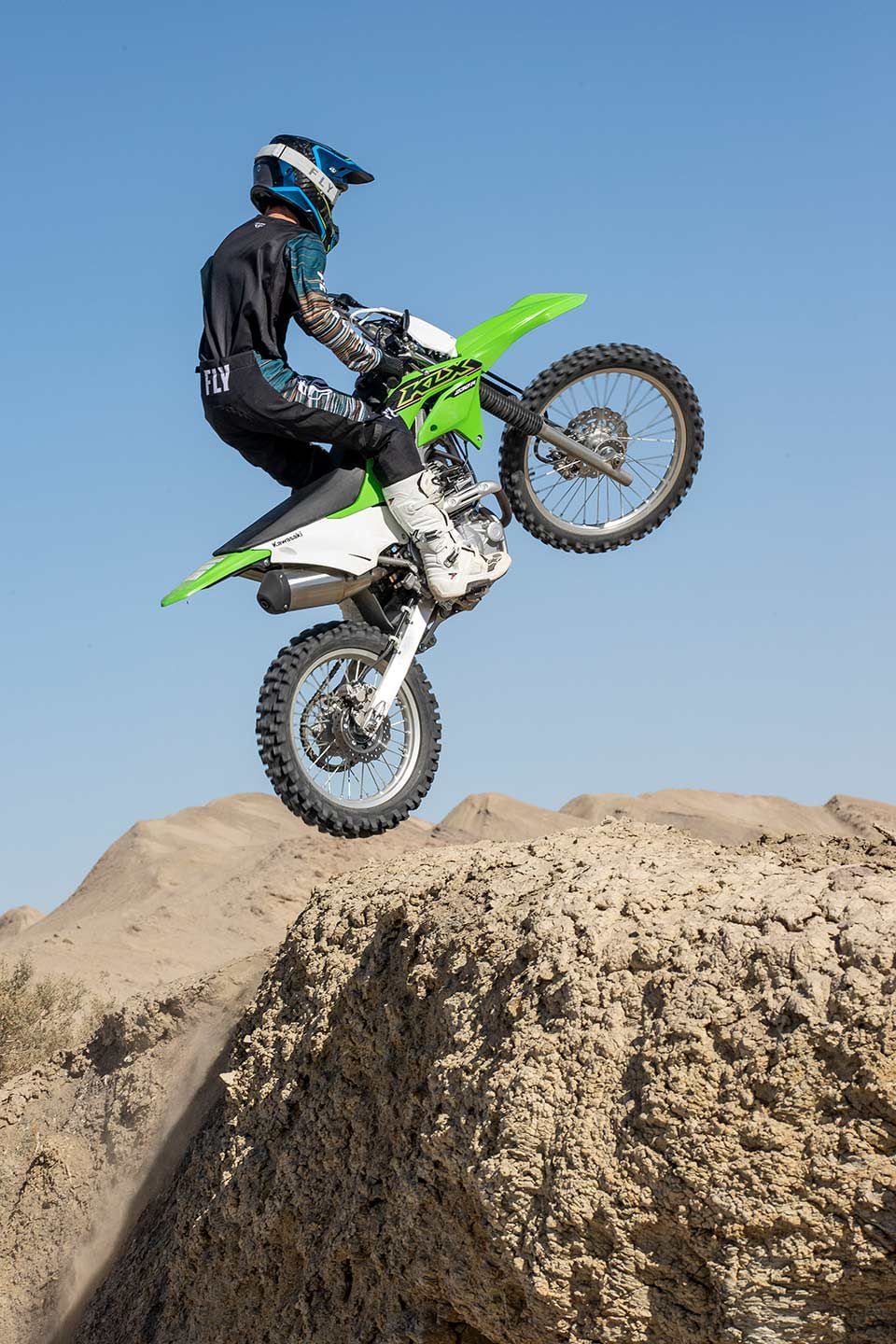
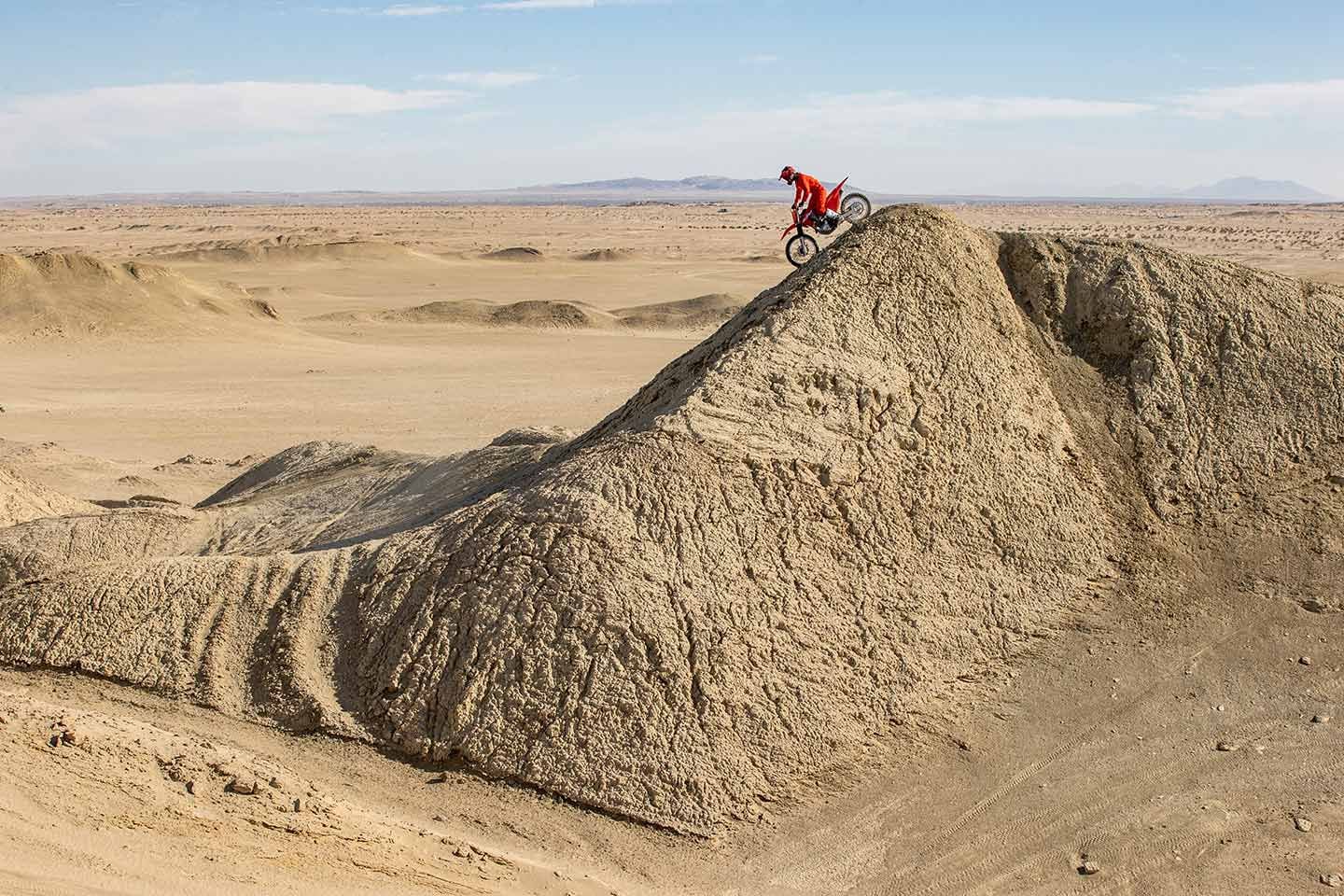
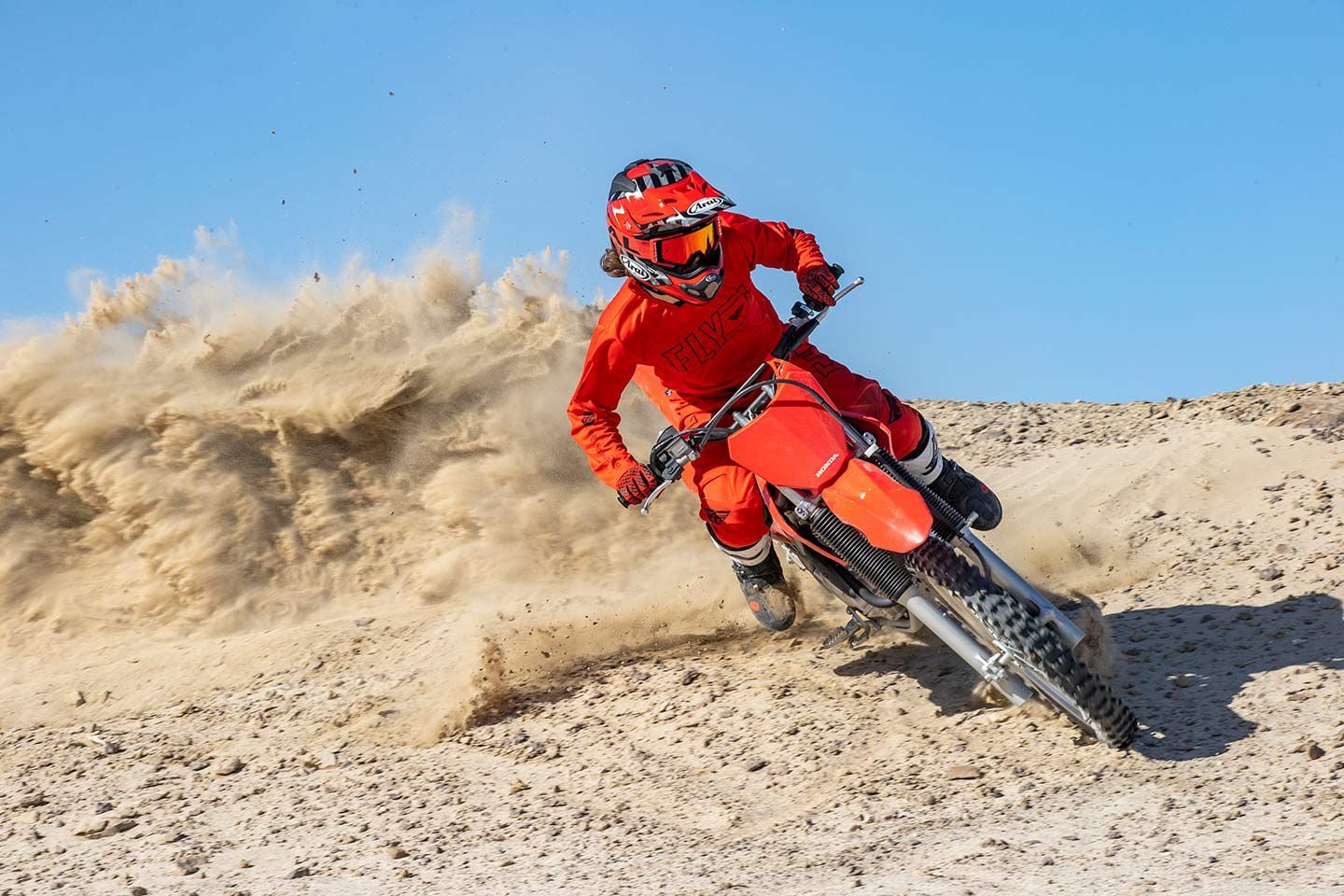
Specs
| 2022 Honda CRF250F | 2022 Kawasaki KLX230R | |
|---|---|---|
| MSRP: | $4,749 (2023: $4,899) | $4,599 (2023: $4,749) |
| Engine: | SOHC, air-cooled single-cylinder; 4-valve | SOHC, air-cooled single-cylinder; 2-valve |
| Displacement: | 249cc | 233cc |
| Bore x Stroke: | 71.0 x 63.0mm | 67.0 x 66.0mm |
| Compression Ratio: | 9.6:1 | 9.4:1 |
| Transmission/Remaining Drive: | 5-speed/chain | 6-speed/chain |
| Cycle World Measured Horsepower: | 20.1 hp @ 7,500 rpm | 17.9 hp @ 7,700 rpm |
| Cycle World Measured Torque: | 15.5 @ 6,000 rpm | 14.4 @ 6,100 rpm |
| Gas System: | EFI w/ 34mm throttle physique | DFI w/ 32mm Keihin throttle physique |
| Clutch: | Moist, multiplate | Moist, multiplate |
| Engine Administration/Ignition: | Full transistorized | TCBI digital advance |
| Body: | Metal | Excessive-tensile metal, box-section perimeter |
| Entrance Suspension: | 41mm telescopic fork; 8.5 in. journey | 37mm telescopic fork; 9.8 in. journey |
| Rear Suspension: | Professional-Hyperlink Showa single shock, spring preload adjustable; 9.1 in. journey | Uni-Trak linkage system and single shock, spring preload adjustable; 9.9 in. journey |
| Entrance Brake: | 2-piston caliper, 240mm disc | 2-piston caliper, 240mm disc |
| Rear Brake: | 1-piston caliper, 220mm disc | 1-piston caliper, 220mm disc |
| Wheels, Entrance/Rear: | 21 in./18 in. | 21 in./18 in. |
| Tires, Entrance/Rear: | 80/100-21 / 100/100-18 | 80/100-21 / 100/100-18 |
| Rake/Path: | 26.5°/4.0 in. | 26.5°/4.4 in. |
| Wheelbase: | 55.9 in. | 53.5 in. |
| Floor Clearance: | 11.3 in. | 11.8 in. |
| Cycle World Measured Seat Top: | 34.7 in. | 36.2 in. |
| Gas Capability: | 1.6 gal. | 1.7 gal. |
| Cycle World Measured Moist Weight: | 264 lb. | 253 lb. |
| Contact: | powersports.honda.com | kawasaki.com |
[ad_2]
/cloudfront-us-east-1.images.arcpublishing.com/octane/YVZCRBFHCJD6NBRODSS6FVUTNE.jpg)